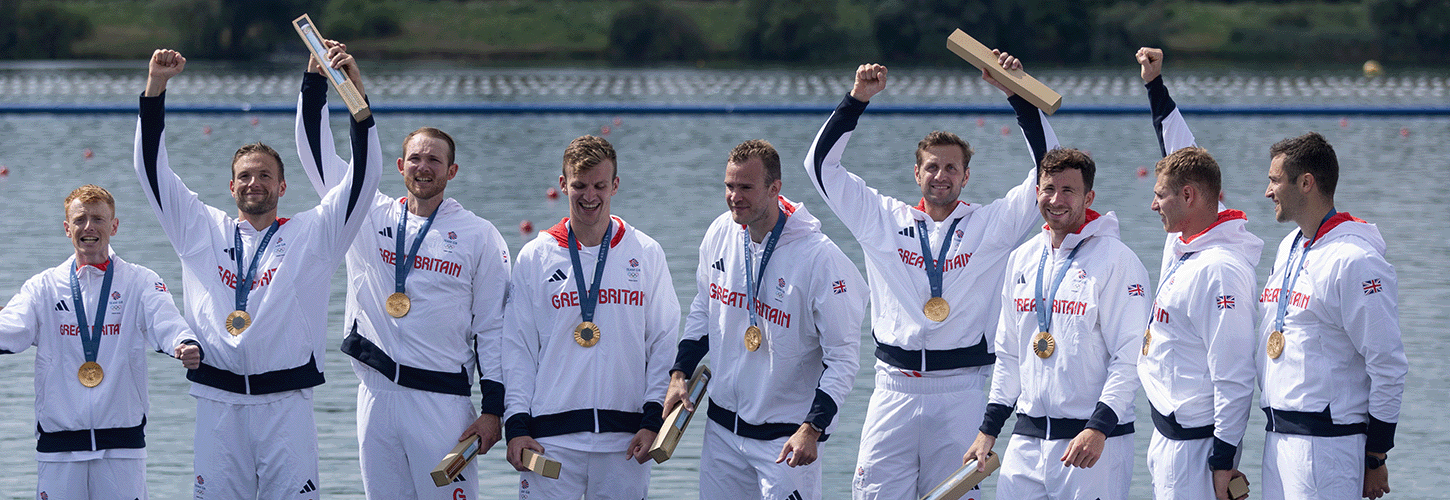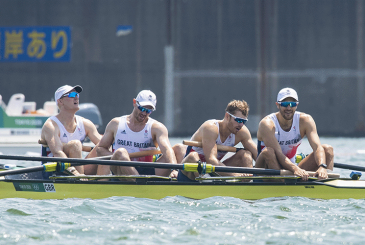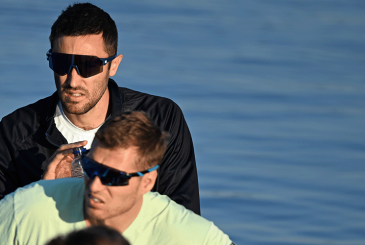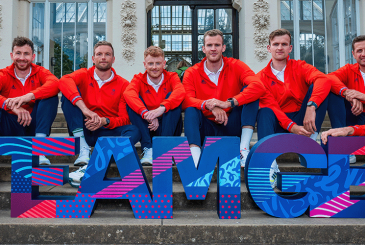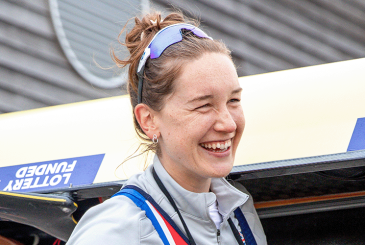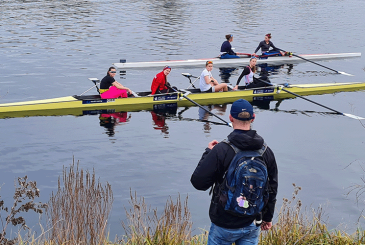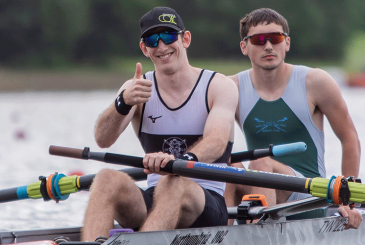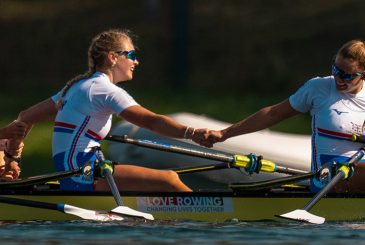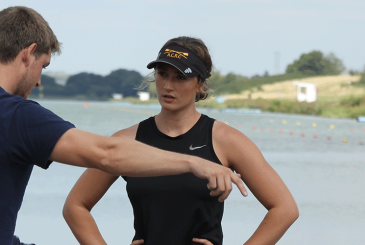Paris 2024 Olympic Champion Morgan Bolding reveals the process-driven thinking that he’s used to guide his entire rowing career – and every race.
I’m coming through the 1000m marker of my Olympic final. We’ve blasted out of the blocks harder than ever before. We’re level with the Dutch eight – stroke for stroke, seat for seat. This is it.
Eighteen years of work have led me here. I started rowing at 11, and since then, I’ve taken over 10 million strokes, lifted 10 million kilos, and consumed 25 million calories. Now, with three minutes left in the biggest race of my life, everything hangs on the next 100 strokes.
My lungs are burning, my legs are screaming, and the pressure is relentless. Through the deafening roar of an Olympic men’s eights final, our cox Harry’s voice cuts through -reassuringly calm, yet powerfully assertive:
“Still level seats with the Dutch. Trust it. Trust it.”
Trust what, you might ask?
Trust the process.
This concept wasn’t anything new to me. My journey – from an unspectacular Cornish rower to competing in an Olympic final – was built on a process I had to trust, every single day, for 6,500 days.
The secret to that trust? A clear framework to guide me. Let’s call it O-A-R: Outline-Actualise-Review
Outline: What are your goals and how do you achieve them?
Ambitious goals are often influenced by luck and uncontrollable factors. The key is to define the best process for achieving them. It’s easy to get discouraged when uncontrollable factors cause failure, or worse, when luck leads to success and complacency follows. In either case, the best approach is to return to the process you’ve established and trust it.
My goal was to win the Olympics. But how was I going to do that?
After 13 years of chasing the national team, I finally made it in 2019. A fourth place at final trials earned me an invitation to make rowing my job at Caversham. That summer, I was selected for the men’s pair at the World Championships. We needed 11th or better to qualify the boat for GB at the Olympics. We finished 12th – not the debut I wanted. I realised that just showing up, doing the training, and going home wasn’t going to be enough to secure selection for the Games, let alone win the Olympics. I needed a plan – a Gold Medal Process to get me there.
How? By directing my focus to where it needed to be; the factors in my control.
| O-A-R: The framework behind Olympic success | Out of my control: push out of my mind |
|---|---|
| 8+ hours sleep | The training program |
| Protein serving every 2-3 hrs | The aches and pains of full time training |
| Food within 15 mins of training | Bad results in the past |
| Long warm up and stretch for robustness | Unpreventable illness/injury |
| Off feet at every opportunity outside of training | The ability of my competitors |
Actualise: Deliver your process, every day, no matter the result
My hard work and revised strategy paid off; next season I was selected in the men’s eight for the 2020 Tokyo Olympics. I had realised my childhood dream! Then, 10 days later, the Olympics were postponed due to Covid. The achievement that was 13 years in the making was taken away in an instant. But ahead of me was lockdown and to have any hope of reselection for the Olympics in 16 months’ time I had to actualise my best process and deliver it, every single day, without fail.
| Controllable | Strategy for delivering it |
|---|---|
| Healthy diet | Buying a 65 litre freezer, meal prepping religiously |
| 8+ hours sleep | No training after dinner, no screens before bed, blackout curtains, lie in if necessary |
| Positive approach to every session | Gaming and socialising virtually to recharge my battery and prepare me for another tough session |
| Technical development | Video as much as possible, review with coach |
| Training at correct intensity | Heart rate monitor, RPE, removing the temptation of making steady state sessions competitive |
Review: Monitor and review your process, ensure you’re always taking the right strokes
By consistently delivering my process through six months of lockdown, 2021 became my most successful season yet. I set personal bests in everything. But when selection for the rescheduled 2021 Olympics came around, I was the only member of the 2020 eight not to be reselected in 2021. I failed again, 14 years of my life spent rowing, I was the best I’ve ever been and it wasn’t good enough.
But I had to keep going, I couldn’t afford to stop, and I was instead selected for the men’s pair. Because I had finished 12th at the 2019 World Championships, we now had to race at the Final Olympic Qualification Regatta – known as the ‘Regatta of Death’ – in Lucerne in May to earn our spot at the Olympics.
It was time to review my process, coming off the back of lockdown I was in the best shape of my life. But why? Which parts of my process were working and which parts needed to be changed? How could we refine our technical process now we’re back on the water? The key to answering this question was tracking.
| Controllable | How to track and review it |
|---|---|
| Technical ability | Telemetry, video |
| Technical synchronicity within crew | Telemetry, video, regular crew meetings, erging in time with mirrors/on connected sliders |
| Physical development on ergo | Comparing training journal to ergo scores in the same period |
| Mental strength development | RPE tracking, how hard did I push myself on that test? Could I have gone earlier? Could I have pushed harder? |
| Healthy diet | Food diary, for what you eat but also for how/when you eat |
Follow your process, no matter the circumstances
The result of the 2021 ‘Regatta of Death’? Fourth. No Olympics for me.
Following the most devastating result of my rowing career, where my dreams of the Tokyo Olympics were crushed for good, what was I to do? I wanted to go home. I wanted to stop pouring every ounce of my being into a dream that was clearly never meant to be. Yet in the hours following the final, I didn’t go out drinking, and I didn’t stay up late or sulk all day in the hotel room.
My dreams weren’t crushed, they were simply three years away instead of three months. And so, with my dream still intact, I knew that all I had to do was grab my O-A-R and get back to work.
Outline: How do I achieve my goal?
- Recover from racing
- Get back into training
- Refine technique
- Learn from mistakes
Actualise: How do I deliver my process?
- Warm down walk after final
- Ergo session next day
- Back training in pair day two
- Stretching/core
- Healthy eating
- 8+ hrs sleep
Review: What can I learn and refine from the Qualification Regatta?
- Race plan
- Technique
- Training/race prep before qualifiers.
Could wasting your next session lose you 18cm?
We stayed out in Lucerne for a week after the race and just six days after failing to qualify for the Olympics, an opportunity came out of nowhere. As reserve for World Cup II, the final race before the Olympics, I was asked to sub into the very same boat I’d lost my seat in three months earlier; the men’s eight.
We raced well, pushing the German eight the whole way but with 150m left, they were leading by more than they had been for the whole race. In a world of hurt, we didn’t panic, 20 strokes of process left to deliver. We nudged our bows ahead of the Germans on the final stroke to win by 18cm. And with that performance I showed my worth, earning my shot at a seat in the men’s eight in 2022.
Throughout my rowing career I faced failure again and again. And whilst every sign was telling me I wasn’t good enough, every logical part of my brain said I should quit, I kept ignoring the factors out of my control and going back to O-A-R. I owe every single one of those 18cm to my ability to execute the right process in every situation.
Now in 2024, with just 100 strokes left of my Olympic final, I keep my head forward, I shut out the crews around me who are out of my control and I deliver the best process possible to help my crew win Olympic Gold.
Encouraging message
Whatever your dream may be, remember this: success isn’t determined by one moment or one result, but by the commitment to a process you can trust. When setbacks come – and they will – don’t let them define you. Instead, pick up your O-A-R: Outline your goals, Actualise your process, Review your progress and repeat. Keep moving forward, one stroke at a time. The journey will test you, but the more you are tested, the stronger your O-A-R will be. Unwavering belief in the process will carry you to the finish line of any goal, even if it takes 18 years.
Banner photo: Team GB (Morgan is third from the right).


